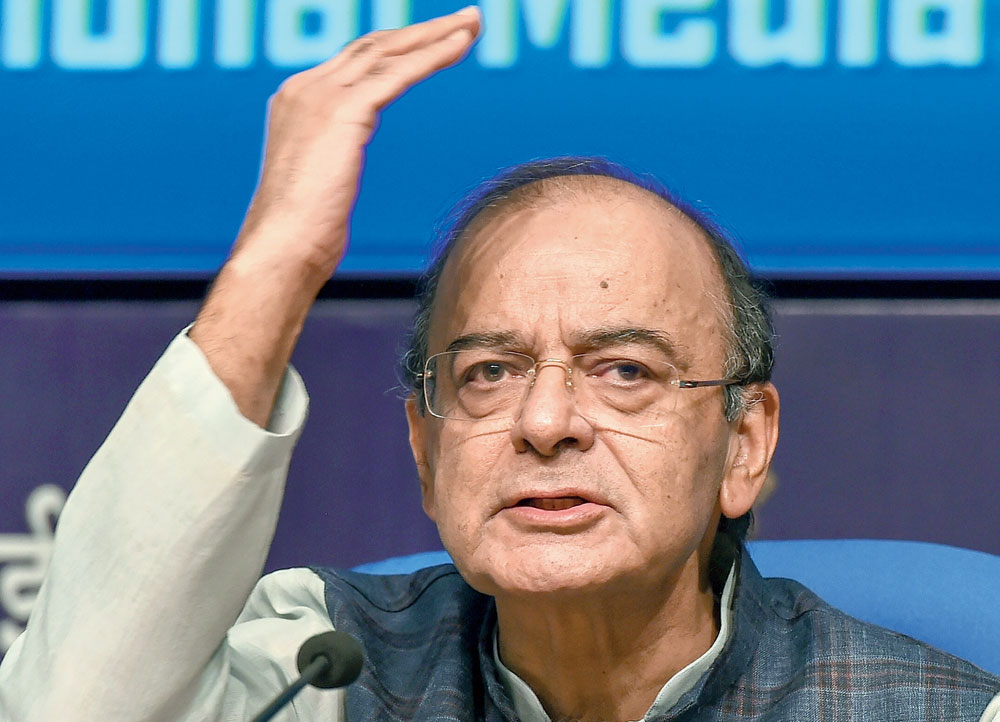New Delhi: Finance minister Arun Jaitley and the BJP on Thursday defended the demonetisation against the Opposition’s attacks on its second anniversary and retaliated against the Congress, but Prime Minister Narendra Modi and party president Amit Shah maintained silence.
Writing a blog, Jaitley argued the note recall had become necessary because the “system required to be shaken”.
His party put 10 questions to the Congress on Twitter and slammed it for opposing a “bold move” like the demonetisation.
Speaking to reporters, Jaitley hit back at former Prime Minister Manmohan Singh, who had come up with a scathing criticism of the note withdrawal on Thursday.
“What happened to the prophets of doom who predicted a 2 per cent hit to the GDP? For the fifth year running, for the first time in its history, India has been the fastestgrowing large economy,” Jaitley said.
“Under the leadership of the Prime Minister we took decisive steps. These steps will help us in the long run. We can see the effect in just two years.”
Modi and Shah, the BJP’s top two leaders, chose to ignore the Opposition attacks. Instead, they took to Twitter to wish sidelined party veteran L.K. Advani on his 91st birthday and laud his contributions to the party.
In his blog, Jaitley tried to project the demonetisation as step in a “chain of important decisions taken by the government to formalise the economy” and generate more revenue and resources for the poor and build better infrastructure.
“An illinformed criticism of the demonetisation is that almost the entire cash money got deposited in the banks,” Jaitley wrote.
“Confiscation of currency was not an objective of demonetisation. Getting it into the formal economy and making the holders pay tax was the broader objective. The system required to be shaken in order to make India move from cash to digital transactions.”
Jaitley claimed that the demonetisation had led to “higher tax revenue and a higher tax base”.
The BJP’s official Twitter handle, @BJP4India, targeted the Congress under the hashtag #CorruptCongressFearsDemo.
“Why does Congress find merit in protesting against every anticorruption measure of the Government of India? What do they fear?” the BJP asked, seeking to project the note withdrawal as an anticorruption measure.
“Can the Congress name even one stringent measure they took during the UPA regime, which was aimed at eliminating corruption and black money?”
Jaitley reaffirmed that return of money to the banks had helped the economy. “Demonetisation compelled holders of cash to deposit the same in the banks…. The violators faced punitive actions,” he wrote.
“Larger deposits in banks improved lending capacity for the banks. A lot of this money was diverted to the mutual funds for further investments. It became a part of the formal system.”
Jaitley quoted figures to claim that the note recall had led to a huge jump in digital transactions: “Today Visa and Mastercard are losing market share in India to indigenously developed payment system of UPI and RUPAY Card whose share have (sic) reached 65 per cent of the payments done through debit and credit cards.”
Jaitley claimed the demonetisation had led to higher personal and corporate incometax collections.
“The impact of demonetisation has been felt on (the) collection of personal incometax. Its collections were higher in 201819 (till 31102018) compared to previous year by 20.2 per cent,” he wrote.
“Demonetisation and implementation of the GST curbed cash transactions in a big way…. This formalisation of the economy has led to the taxpayer base increase (sic) from 6.4 million in the preGST regime to 12 million taxpayers in the postGST regime.”
Jaitley claimed that the demonetisation had led to “more formalisation, more revenue, more resources for the poor, better infrastructure, and a better quality of life for our citizens”.











